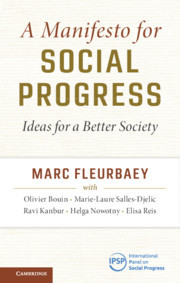Description
A Manifesto for Social Progress
Ideas for a Better Society
Author: Fleurbaey Marc
Prefaced by: Sen Amartya
Outlines how to rethink society's economic, political, and social institutions and actions to take to build better societies.
Language: English
Subject for A Manifesto for Social Progress:
Approximative price 50.95 €
In Print (Delivery period: 14 days).
Add to cart
Publication date: 08-2018
248 p. · 15.7x23.6 cm · Hardback
248 p. · 15.7x23.6 cm · Hardback
Description
/li>Contents
/li>Biography
/li>
At this time when many have lost hope amidst conflicts, terrorism, environmental destruction, economic inequality and the breakdown of democracy, this beautifully written book outlines how to rethink and reform our key institutions - markets, corporations, welfare policies, democratic processes and transnational governance - to create better societies based on core principles of human dignity, sustainability, and justice. This new vision is based on the findings of over 300 social scientists involved in the collaborative, interdisciplinary International Panel on Social Progress. Relying on state-of-the-art scholarship, these social scientists reviewed the desirability and possibility of all relevant forms of long-term social change, explored current challenges, and synthesized their knowledge on the principles, possibilities, and methods for improving the main institutions of modern societies. Their common finding is that a better society is indeed possible, its contours can be broadly described, and all we need is to gather forces toward realizing this vision.
Introduction: the future is in our hands; Part I. Much to Worry, Reasons for Hope: 1. Looming catastrophes; 2. Globalization and technology: choices and contingencies; 3. The expanding circle of respect and dignity; 4. The big challenge; Part II. Acting for Social Progress: 5. In search of a new 'third way'; 6. Reforming capitalism; 7. From the welfare state to the emancipating state; 8. From polaritics to politics; Conclusion: mobilizing change-makers.
Marc Fleurbaey is an economist, professor at Princeton University (Woodrow Wilson School and Center for Human Values) and member of Collège d'Etudes Mondiales (Paris FMSH). He is the co-author of Beyond GDP (with Didier Blanchet, 2013), A Theory of Fairness and Social Welfare (with François Maniquet, Cambridge, 2011), and the author of Fairness, Responsibility and Welfare (2008). He was a coordinating lead author for the IPCC 5th Report, and one of the initiators of the International Panel on Social Progress. He is also a member of the UN Committee on Development Policy, and of the Council for Global Problem-Solving.
© 2024 LAVOISIER S.A.S.
These books may interest you

Citizens, Families, and Reform 160.25 €



